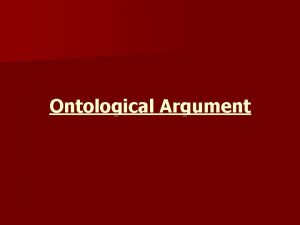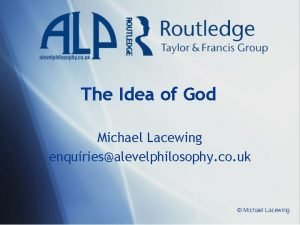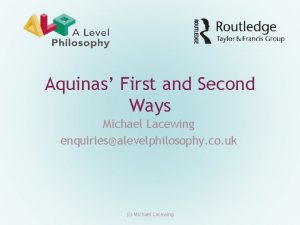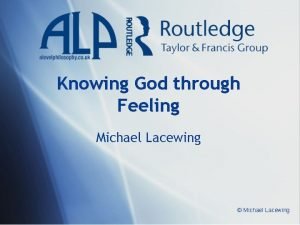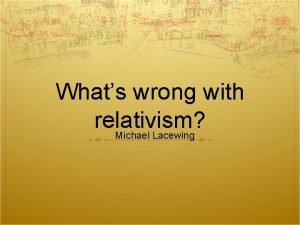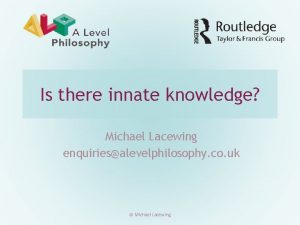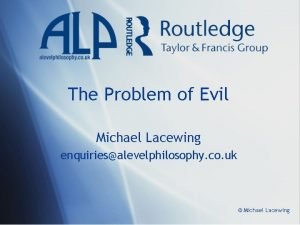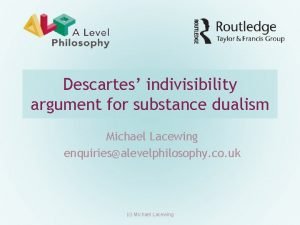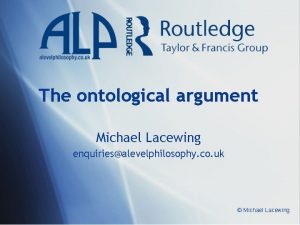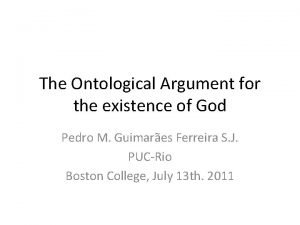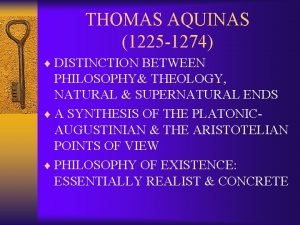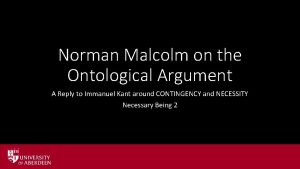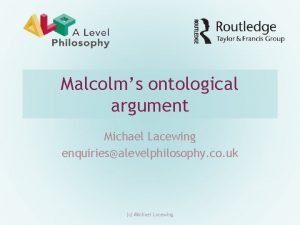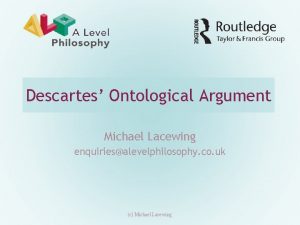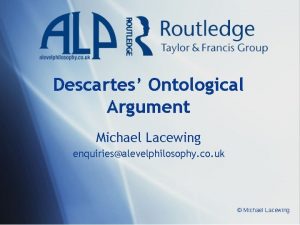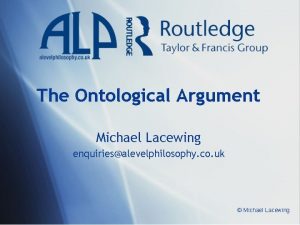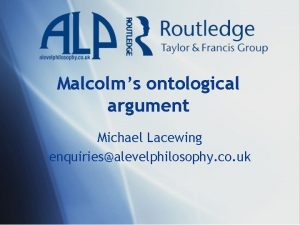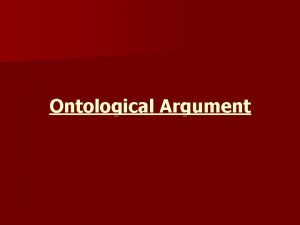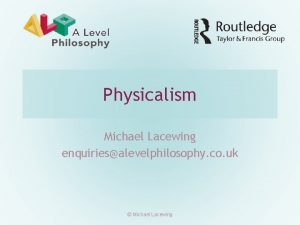Plantingas ontological argument Michael Lacewing enquiriesalevelphilosophy co uk














- Slides: 14

Plantinga’s ontological argument Michael Lacewing enquiries@alevelphilosophy. co. uk

Possible worlds • A ‘possible world’ is a way of talking about how things could have been. • Propositions describe ‘states of affairs’ – Propositions can be true or false – A proposition that is true describes the way things are, the actual world – A proposition that is false describes the way things are not, a false state of affairs.

Possible worlds • A proposition that is contingently false describes a possible state of affairs, a way things could be but aren’t – A proposition that is necessarily false describes an impossible state of affairs. • ‘I was born in Kenya’ is false, but could have been true – In some possible world, I was born in Kenya. • A proposition ‘p’ is true in some possible world W = p would be true if W were the actual world.

Possible worlds • Possible worlds are distinct from one another depending on what we are supposing to be true in that world – Things have different properties in different possible worlds – Different things exist in different possible worlds.

Possible worlds and necessity • A proposition that is necessarily false is false in every possible world. • A proposition that is necessarily true is true in every possible world. • What is necessarily true and necessarily false doesn’t change from one possible world to another – ‘ 2 + 2 = 5’ is false in every possible world. ‘It is possible that ‘ 2 + 2 = 5’ is also false in every possible world.

Interpreting the ontological argument • ‘It is possible that God exists’ – = ‘There is some possible world in which God exists’. • ‘It is necessarily true that God exists’ – = ‘God exists in all possible worlds’. • ‘It is greater to exist in reality than to exist only in the mind’ – = ‘If x exists in some possible world W 1 but doesn’t exist in another possible world W 2, then x’s greatness in W 1 exceeds x’s greatness in W 2. ’

Interpreting the ontological argument • ‘God is a being greater than which cannot be conceived’ – = ‘God is the greatest possible being’ – = ‘There is a possible world in which a being (God) exists which has the maximum possible degree of greatness – no other being, in any possible world, has more greatness. ’ • It is not contingent that God is the greatest possible being – For God to be God at all, then God is the greatest possible being – So in any possible world in which God exists at all, God is the greatest possible being.

Maximal excellence and maximal greatness • Maximally excellent: having the properties of omniscience, omnipotence, supreme goodness, etc. , in one possible world. • A being that has maximal excellence in every possible world is greater than a being that is maximally excellent in one possible world – Greatness depends not just on the properties a being has in one possible world, but what properties it has in other possible worlds as well. • A maximally great being will be a being that is maximally excellent in every possible world.

Plantinga’s argument • Necessarily, a being has maximal excellence in a given possible world only if it has omniscience, omnipotence, supreme goodness, etc. , in that possible world. • Necessarily, a being is maximally great only if it has maximal excellence in every possible world. • A maximally great being is possible, i. e. there is a possible world in which there is a being that has maximal greatness. • Therefore, a maximally great being exists (in the actual world).

Plantinga’s argument slowly • A maximally great being is possible, i. e. there is a possible world in which there is a being that has maximal greatness. • Therefore, there is a possible world in which a being exists such that it has maximal excellence in every possible world. • Therefore, there is a possible world in which a being exists such that it exists and has maximal excellence in every possible world.

Plantinga’s argument slowly • Therefore, a maximally great being exists in every possible world. • Therefore, a maximally great being exists (in the actual world). • By definition, God is a maximally great being. • Therefore, God exists.

Objections • Is a maximally great being possible? Is the concept coherent? – Plantinga accepts that he hasn’t demonstrated this, but we need a good reason to believe that it isn’t. • The concept of maximal greatness is of a maximally excellent being that exists in every possible world – Isn’t this begging the question? To accept that this is possible is already to accept that it is necessarily true that this being exists.

Objections • Is the definition of maximal greatness coherent? – It assumes that x’s greatness in a world in which x exists exceeds x’s greatness in a world in which x doesn’t exist. • Can we compare the greatness of x when existing with the greatness of x when not existing? – When x doesn’t exist, we shouldn’t say that x has no greatness (0 degrees) – We should say that we can’t talk of x’s greatness at all – Therefore, we can’t compare x’s greatness where x does exist with x’s greatness where x doesn’t exist – Therefore, it is not greater to exist than not to exist.

Objections • If it is not greater to exist than not to exist, we can say only this about God: – In every possible world in which God exists, God is the greatest possible being – The greatest possible being need not exist in every possible world – Therefore, it is possible that God does not exist.
 Ontological argument
Ontological argument Michael lacewing
Michael lacewing Michael lacewing philosophy
Michael lacewing philosophy Michael lacewing
Michael lacewing Descriptive relativism
Descriptive relativism Michael lacewing
Michael lacewing Michael lacewing
Michael lacewing Indivisibility argument
Indivisibility argument Challenges to the ontological argument
Challenges to the ontological argument Anselm argument for god
Anselm argument for god Ontological argument
Ontological argument Ontological argument for god
Ontological argument for god Ontological argument for god
Ontological argument for god Norman malcolm ontological argument
Norman malcolm ontological argument Ontological argument
Ontological argument
